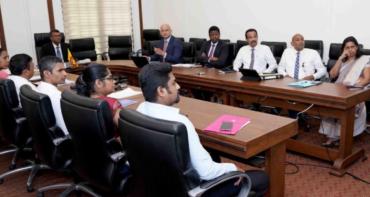Eighteen Commonwealth countries shared their plans for moving from fragile to robust accounting standards for greater economic prosperity at a Commonwealth Secretariat meeting from 18 to 20 June 2012.
Under the event theme ‘Strengthening accountability and information for decision making in Commonwealth public sector’, delegates examined the merits of and shared their experiences and challenges of moving towards International Public Sector Accounting Standards (IPSASs).
Accountants, auditors-general, and other public officials heard that the quality and availability of public services; economic prosperity, growth and jobs; accountability, trust and confidence in government; and the quality of people’s lives and their social mobility, are affected by the quality of financial information provided and used to inform government policy decisions.
Alluding to the effects of the current global financial crisis and the uncertainty surrounding the true financial position of countries ‘entering into complex bail out transactions’ Chief Executive of the Chartered Institute of Public Finance and Accounting (CIPFA), Steve Freer, stressed to delegates the critical need for change, including moving from cash to accrual accounting.
“Cash accounting is simply not up to the challenge of reflecting the full financial position of a government,” he said. “Solutions built on such fragile foundations are bound to fail.
“We need to own this problem and make sure that we replace fragile foundations with sturdy robust foundations.”
Cash and accrual based accounting are the two principal methods of keeping track of income and expenses.
Under the cash method, income and expenses for work are not recorded until cash is actually received or paid.
Under the accrual method, transactions are recorded when an order is made or the work occurs regardless of when the money for them is actually received. In this way countries or businesses can track their projected cash flows.
| Why does getting public sector accounting right matter? |
The conference was held at the CIPFA Conference Centre in London, UK. It was sponsored by the Commonwealth Secretariat’s Governance and Institutional Development Division and Commonwealth Fund for Technical Co-operation in collaboration with CIPFA, the African Capacity Building Foundation, Ernst & Young, the Public Expenditure and Financial Accountability Secretariat and the International Public Sector Standards Board.
Dr Joan Nwasike, Head of Thematic Programmes at the Commonwealth Secretariat, explained that given the challenges of countries in moving from cash to accrual accounting, it was important the costs and benefits of the system were analysed.
Dr Nwasike said the event offered the ideal starting point for countries considering the move and an opportunity for them to share experiences and challenges.
“Many countries are at the foundation stage of establishing a reliable cash accounting system with the relevant controls and procedures and will need time to think and make that strategic decision on how to proceed,” she stated.
Deputy Auditor-General for Ghana Benjamin Codjoe said his country is in the midst of financial reform and aiming to eventually adopt the accrual based system.
“This meeting will help us draw a road map to quickly come on board with the IPSASs and it has been an eye opener to let us know what to do and the systems to put in place to have a smooth transition,” he stated.
Accounting-General in St Lucia Marie Monrose said the conference will help the country to chart the way forward in implementing international standards.
“It was a very good conference because our aim is to strengthen public financial management and as a developing country it can be challenging to do it on our own,” she commented.
The conference also provided greater insight on the achievements of member countries in their adoption of financial accounting and reporting standards; and a resolution from member states on their needs from the Commonwealth Secretariat.
Countries in attendance were: Antigua and Barbuda, The Bahamas, Botswana, Cyprus, Ghana, Malaysia, Malta, Namibia, Pakistan, St Kitts and Nevis, St Lucia, Samoa, Seychelles, Sierra Leone, South Africa, Swaziland, Uganda and the Cook Islands.



